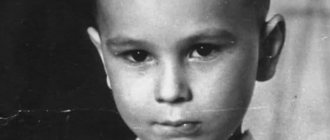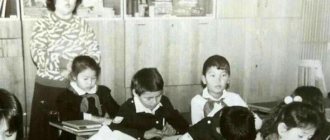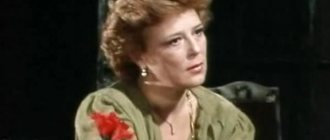Childhood and youth of a musician
The artist's real name is Igor Fedorovich Letov. The performer was born in the city of Omsk on September 10, 1964. Even at birth, Yegor Letov had to fight for his existence, since the birth was very difficult, which endangered his life. Letov grew up as a very smart boy, and from the age of two he spoke very well, mastered reading early, and was very fond of geography. Already at the age of six, the future musician could recite the entire map of the world from memory. Egor Letov was very fond of collecting and studying various things that could interest him at least a little. Yegor’s mother was a doctor, and his father held a military post for a long time, and later became acting secretary of the city district committee of the Communist Party of the Russian Federation.
At school, Yegor Letov studied with varying degrees of success and had a skillful skill in fooling his teachers. He started playing the guitar in school and studied with teachers for six years. As a teenager, Letov began composing lyrics with his comrades. After this, music became more than just a hobby for Yegor - he plunged into it headlong.
In the Letov family, Yegor was not the only musician; from childhood, the boy was instilled with a love of music thanks to his older brother Sergei. Sergey Letov is a famous musician, saxophonist, improviser. In 1982, Egor graduated from school and moved to his brother in the Moscow region, entered a vocational school to become a builder, but after a year of training he was expelled for poor academic performance. After which, returning back to Omsk, Yegor began working at two industrial factories in Omsk as a graphic designer. Later, Yegor Letov worked part-time as a plasterer and janitor.
Childhood
The elder brother of the future musician is Sergei, a virtuoso saxophonist who works in various genres. It was he who became an example for Yegor, both in his work and in life. Letov studied well at school, was a sociable and versatile child.
Letov with his brother Sergei
Having received his matriculation certificate, he left his parents' home in Omsk and went to Sergei in the Moscow region. Here the guy entered a local school, from where he was expelled in disgrace.
In 1982, returning to his small homeland, Yegor got a job at a tire and engine manufacturing plant. Here the guy held the position of artist. He had to draw portraits of Lenin, propaganda leaflets for rallies and meetings.
He also worked as a janitor and laborer at a construction site. Having earned one hundred rubles, Letov bought an Orpheus bass guitar and speakers with a built-in amplifier.
Music by Egor Letov
In 1982, before entering vocational school, Letov began working on the creation of the musical project “Posev”. Upon returning to Omsk, the future “patriarch of Siberian rock” continued to actively engage in music and the development of his musical project.
The members of the Posev group recorded their first songs on magnetic albums. This process took place at home without the use of professional equipment. The sound was very muffled and sometimes unclear. In the future, when the group had the opportunity to record their songs on high-quality recording equipment, the songs still had sound rattling. In his interviews, Egor Letov more than once noted that he consciously abandoned the purity of sound in order to create a feeling of “garage atmosphere” in his songs, which became his signature performance style.
1987
This year the group plays at its first major festival, which was held in Novosibirsk. By that time, perestroika was in full swing with its slogans about glasnost - it became easier to speak out. In the same year, five albums were recorded at once (“Necrophilia”, “Mousetrap”, “Totalitarianism”, “Okay!!” and the electric version of “Red Laughter”). Some songs appear influenced by psychedelia and experimental exploration. These changes were drawn from the creativity of Western groups of the 60s.
Then Yegor meets Yanka Diaghileva. Their creative tandem remains iconic in the Russian rock underground. Yanka participated in the recordings of “Civil Defense” and some other projects of Yegor. She disappeared and died tragically in 1991.
Creation of the legendary group "Civil Defense"
In 1984, the musical project “Posev” ended its existence, after which the legendary group “Civil Defense”, also called “Grob” or “G.O.”, was immediately formed. Letov enjoyed his work and was completely immersed in writing songs, which he continued to perform in his favorite “garage” style.
When the group’s activities began to bring in money, Letov and his friends opened an independent recording studio called “Grob-Records”, where the group’s albums, which are still popular to this day, were recorded. The studio was located in an ordinary apartment, and Yegor also gave other Siberian rock musicians the opportunity to record their songs in it.
Soviet youth immediately appreciated “Civil Defense” for its unique performance style and very frank songs for that time. Magnetic albums with the group's recordings were passed from hand to hand, and concerts were organized underground. Yegor Letov loved this spirit of adventurism. The songs became more and more popular every day and were loved by listeners due to their deep meaning, original sound and memorable rhythm.
Letov’s natural nihilism and his eternal “against” inspired young people, and his innate talent and high authority could lead anyone. Proof of this authority is the many Russian punk bands that to this day try to be like Civil Defense.
Discography
Egor (Igor) Letov could not do without solo albums and bootlegs. The biography of this musician is interesting to almost every young rocker.
Nowadays there really are a lot of people who want to do the same activity and get success. Therefore, the discography should also be considered.
Solo albums:
- “Music of Spring” - 2 parts - 1990-93;
- “Russian Field of Experiment” - 1988;
- “The Letov Brothers” - recorded with the participation of brother Sergei - 2002;
- “Tops and Roots” - 2 parts, both in 1989;
- “The holiday is over” - 1990.
Bootlegs:
- “Acoustics in Karaganda” - 1998;
- “Egor and Yanka” - 1989;
- “Songs into the Void” - 1986;
- "Air Worker Wars" - 1992.
Special services and psychiatric hospital
At the peak of the popularity of “Civil Defense,” the special services became interested in Yegor Letov. Letov was an opponent of the established system and communism, but at the same time he did not object to Soviet power. His songs contained political and philosophical overtones that could not be hidden behind punk indifference.
Letov was repeatedly subjected to meetings with employees of the USSR State Security Committee, they demanded the cessation of the activities of Civil Defense. In 1985, after Egor Letov refused, he was placed in a psychiatric dispensary. He was forcibly treated with potent antipsychotics, which have the ability to change the patient’s psyche. Afterwards, Letov himself compared these methods with a lobotomy.
Four months later, Yegor was discharged thanks to his older brother, who threatened to publish a story in Western media about how the Soviet government was fighting unwanted musicians.
Interesting facts from the life of Letov
- The lyrics of the song “Overdose” from the album “One Hundred Years of Solitude” were written by Yegor Letov after his cat, who had lived for 11 years, died.
- Several times Letov was banned from entering Estonia and Latvia.
- Yegor himself said that he wrote almost all the songs from the albums “Reanimation” and “Long, Happy Life” while under the influence of drugs.
- At the first major concert of Civil Defense, held in 1988, Letov appeared on stage in bell-bottoms and a pea coat, and sang not very respectful songs about Lenin.
- When the KGB began to take a serious interest in Letov in 1985, he was even accused of planning an explosion at an oil refinery.
- From the moment he left the psychiatric hospital until 1988, Yegor was forced to wander throughout the Soviet Union. At that time, he was even forced to steal food from time to time.
- Egor's brother, Sergei Letov, is a famous jazz saxophonist.
Letov's creativity after discharge from a psychiatric hospital
From 1987 to 1988, Letov continued to work on the Civil Defense project and recorded his popular albums, such as “Everything is going according to plan” and “Mousetrap”. During the same period, Yegor Letov wrote lyrics that in the future won the hearts of rock lovers. At this moment, the musician became an independent performer of his songs, sound engineer and producer. In 1989, he began working with Yana Diaghileva. In 1990, Letov closed the Civil Defense project, but already recreated it in 1993. The group "Civil Defense" gave its last concert shortly after the musician's death - on February 9, 2008.
First attempts on the path to popularity
Also in 1982, Yegor organized the Posev project, named after the political magazine . In it, Letov took the place of the front Babenko played the electric guitar, Evgeniy “John Double” Deev was the bassist, as well as Oleg Ivanovsky on the acoustic guitar. Two years later, Konstantin Ryabinov joined the group.
The guys chose an unusual direction: punk rock, psychedelia, garage punk. During the existence of the group, 11 records were recorded and two live concerts were played.
At the end of 1984, Letov presented a new project called “Civil Defense” or “GrOB”, “GO”. Soon the musician opened a home recording studio, GroB Records, where he and his friends recorded experimental compositions. The creativity of the young group did not find support from the state, but it found quite a few informal fans.
In 1985, persecution of Letov’s group by local officials began. According to Yegor, it was a difficult time, the pressure from the authorities reached the point of absurdity. The mother of Andrei “Boss” Babenko, a party woman, wrote a denunciation to the KGB, in which she indicated that her son had been drawn into an anti-Soviet organization. In the fall of the same year, Letov was forcibly sent to a psychiatric clinic, where he stayed for six months.
In the hospital, Yegor was injected with strong drugs, which caused his vision to disappear. In order not to completely go crazy, the musician spent days on end composing poems for new songs. The only one who visited Letov was his colleague in the Civil Defense group Oleg Sudakov, better known as “Manager”. Only he was trusted by the extraordinary musician and passed on fresh texts to him.
After being discharged, Yegor and the boys began recording albums; more than ten records were released between 1987 and 1989 . Among them: “Necrophilia”, “Totalitarianism”, “Red Album”, “Everything is fine!”, “So the Steel Was Tempered”, “Combat Stimulus”, “Mousetrap”, “Everything Goes According to Plan”, “Armageddon-Pops”, “Healthy and Eternal”, “Russian Field of Experiments”, “War”, “Songs of Joy and Happiness”. At this time, Letov began working closely with Yanka Diaghileva.
Letov and Diaghileva
In the early 90s, the existence of the informal group “Civil Defense” was already talked about throughout the USSR. Their performances were filled with powerful energy, original sound, non-standard lyrics and rudeness.
Unexpected news for GO fans was Letov’s message about the dissolution of the team. To replace “Grob”, the artist prepared a psychedelic project “Egor and the Opissed”. A couple of months later, the debut album “Jump-Jump” was presented, and in 1992 “One Hundred Years of Solitude” was recorded.
In 1993, Egor again gathered the guys from “GO” and resumed touring activities. In parallel with recording new songs, Letov led the national communist rock movement “Russian Breakthrough”. During 1994-1998, the musician had party card No. 4.
In 1999, Letov went on tour as part of his support for Viktor Anpilov, who was running for the State Duma. In 2002, “GO” recorded the album “Starfall,” which included popular Soviet compositions, but processed in Yegor’s typical manner.
At the same time, the album “Egor and the Opised” - “Psychedelia Tomorrow” was presented.
At the beginning of 2004, Letov publicly put an end to nationalist movements and political games. The following year, the presentation of the records “Reanimation” and “Long and Happy Life” took place. The musicians also re-recorded the albums “Solstice” and “The Unbearable Lightness of Being,” which received new names “Lunar Revolution” and “The Tolerable Heaviness of Non-existence.” In May 2007, fans enjoyed the latest album of the legendary group “Grob” “Why Dreams.”
On February 19, 2008, Egor Letov died suddenly in Omsk. According to the official version, the artist died of cardiac arrest. But there was also information in the media that the singer was a heavy alcohol abuser. The legendary musician was buried next to his mother at the Old Eastern Cemetery.
Personal life
Letov was unofficially married to his musical colleague Yanka Diaghileva. The couple played together at concerts and spent most of their time together. Yanka was his friend, muse and practically a family member. Unfortunately, in 1991, Yana Diaghileva died mysteriously and tragically.
In 1997, Letov officially married Natalya Chumakova.
Biography and books of the author Letov Egor
Underground
Egor Letov is not just a unique personality. He was one of the most 'real' musicians of the Russian underground. The constant and painful search for new forms of expression speaks of his extraordinary talent. Letov was always underground and in opposition to any government, to any culture, to any morality. He only believed in rock and roll. As the musician himself said, rock is when everything is done to the end: if you live, you live like that, if you don’t, you don’t.
Author: Andrey Puminov
Website: Celebrities
Early years Egor Letov was born on September 10, 1964 in Omsk. His father was a military man, and his mother worked as a doctor. According to his older brother, before the age of 16, Yegor often lost consciousness for no reason, and once even experienced clinical death. In 1982, he graduated from high school and began working as a graphic designer in the propaganda departments of the Omsk Engine and Omsk Tire Plants. Yegor also had to work as a plasterer and janitor. Yegor was introduced to rock music by his older brother Sergei, who later became a famous jazz musician. He studied at Novosibirsk University and often brought records from Akademgorodok. Among them were recordings of such groups as 'The Who', 'Shocking Blue' and others. My brother didn’t delve much into this music, but carried records for material gain. He recorded 'scarce' music for 3 rubles for anyone who wanted it. Yegor's attitude was completely different. According to Letov, listening to The Who for the first time had an “incredibly devastating shock” on him. He realized that this music was meant for him, in it he found himself. Later Egor met such rock bands as The Beatles, Led Zeppelin, Nazareth, Uriah Heep, Pink Floyd. They had a huge influence on his worldview and his development as a musician. Letov said that he absorbed this music and at one point became like an overflowing glass. Yegor developed the desire to do something on his own at the age of 16. He bought a bass guitar in Leningrad and went to his brother in Moscow, where he lived for almost two years. In 1981, Letov returned to Omsk and decided to form his own group. Soviet period In 1982, Egor Letov, together with his friends, the most famous of whom was Konstantin Ryabinov ('Kuzya Uo'), organized the rock band 'Posev'. In 1984, the group reformatted into a new team, Civil Defense, also known by the abbreviations GO and GroB. For a number of reasons, Letov and his comrades recorded all their music in apartment conditions. Firstly, due to the highly social, harsh orientation of the lyrics, the group was constantly subjected to political persecution by the authorities. Secondly, the group had neither connections nor money to record in the studio. Thirdly, because of Letov’s desire not to depend on anyone. After the collapse of the Union, when most of the problems became a thing of the past, the group did not change this practice and continued recording in their home studio. In the second half of the 1980s, Civil Defense gained popularity outside of Siberia, which attracted the attention of the authorities. In 1985, political persecution began. Letov was arrested and forcibly sent for treatment to a mental hospital, where he spent the entire winter. In his autobiography, the musician wrote that he was heavily stuffed with antipsychotics, which almost turned him into a moron. He was even temporarily blind. Yegor saved himself through creativity. He spent the whole day composing poems and stories, which he then conveyed through the bars to his friend Oleg Sudakov. Having deceived both the doctors and the KGB, Yegor Letov returned home, where he continued to study music. In 1987-1989, Civil Defense recorded its best albums: Red Album, Mousetrap, Necrophilia, War, Russian Field of Experiments, Everything Goes According to Plan. Despite his underground activities, Letov and Civil Defense gained incredible popularity in the USSR, mainly among young people. According to some estimates, their army of fans amounted to more than 100 thousand people. Letov became a cult figure, and some of his songs, such as “Everything is going according to plan,” became an anthem that reflected the decaying system of the late Soviet era. The group's popularity was ensured by its powerful energy, simple, lively, energetic rhythm, tough, non-standard lyrics based on rough and at the same time refined poetry. Later creativity In 1990, Letov stopped performing with “Civil Defense” and organized the project “Egor and the Opi...evshie”, within the framework of which he recorded the albums “One Hundred Years of Solitude” and “Jump-Jump”. In 1993, he again assembled 'Grob', recorded albums, and gave concerts. In the 90s, Letov became interested in politics. At first he was one of the leaders of the Russian Breakthrough movement, and in 1994 he became a member of the National Bolshevik Party, which was banned several times due to its radicalism. In 2004, Yegor Letov disowned any political and nationalist forces and within two years released the albums 'Long Happy Life' and 'Reanimation'. Their appearance sparked new interest in the groups
e, both in the press and among the general public. In 2007, the disc 'Why Do I Dream?' was released, which became the last in the work of the underground musician. In February 2008, Yegor Letov passed away. Doctors diagnosed cardiac arrest.
Letov never hid his personal life. The most famous was his union with Yanka Diaghileva, an underground musician and founder of the Red Octobers group. In the last years of his life, Yegor was married to Natalya Chumakova, who became the bass guitarist of GO. Letov had no children. The work of Yegor Letov, which had a great influence on the development of the punk movement, includes more than 1000 compositions. He was and to this day remains one of the brightest and most talented representatives of Russian rock. The famous musician Yuri Shevchuk once said that with the death of Letov, a very important part of the era ended. He was that border, that extreme line of freedom, beyond which complete chaos began.
Death of a musician
The musician died in 2008, on February 19. According to the official version, the cause of death was heart failure, but after some time the cause was changed to respiratory failure due to ethanol poisoning. Yegor Letov was buried in Omsk, near the grave of his mother.
Yegor's father, in his interview after his son's death, emphasizes that Yegor has been drinking a lot lately, and this has affected his health.
Yegor devoted his entire life to music, but, unfortunately, not all of his ideas were realized. Egor Letov achieved a lot in his life and work. The chords of his songs even today are heard in the courtyards of many cities, and Yegor himself lives in the hearts of his fans.
Death
Yegor had many creative ideas, including a film project based on Cortazar’s novel “The Hopscotch Game” and alternative musical projects. However, these plans were not destined to come true.
Funeral of Yegor Letov
On February 19, 2008, the musician and singer died. The cause of Letov’s death was officially named cardiac arrest, but an alternative version was subsequently made public: acute respiratory failure as a consequence of ethanol poisoning.
The funeral, which was attended by many people, including from both capitals, was accompanied by a civil memorial service. Yegor Letov was buried in Omsk next to his mother’s grave.
Death and influence
The musician continued to live in Omsk. Egor Letov died there. The cause of death was sudden cardiac arrest. The musician was 43 years old. At the funeral, a civil memorial service was held for people who were not indifferent to the work of “Grob”. This dispelled doubts about whether Egor Letov remained popular. The cause of death gave rise to numerous rumors, but none of them were confirmed.
After the musician left, a large legacy and archive remained. Based on it, a documentary film “Healthy and Forever” was released in 2014, the title of which is a reference to one of the most popular songs of “Civil Defense”. The chronicle also includes interviews that Egor Letov gave during his tour. Photos and videos of past years presented in the film are exclusive and give a reason to take a fresh look at a unique phenomenon in Russian and post-Soviet culture.
FROM LYRICS TO SHAMANIC CHARMS
During the same period, children's passion for literature was revived in Letov. He begins to collect folklore, slander, sentences and conspiracies, which he introduces into his songs, thereby revealing the Russian soul he understands. Many have heard the cult song “About a Fool,” but not everyone knows that its “magic” is that it is a converted sentence to “death,” where in one of the popular versions it read: “A dead man walks in a circle, looking for a dead man deader than himself.” .
From this moment a new and, perhaps, the most valuable round of Letov’s creativity begins. He begins to write children's, simple, seemingly very kind songs, but inlays them into the texture of ritual sentences. Letov will follow this path from now on until his death. And this effect can be heard most clearly in the song “Long Happy Life”, where the more often Letov repeats the mantra-wish, the more terrible it becomes.











